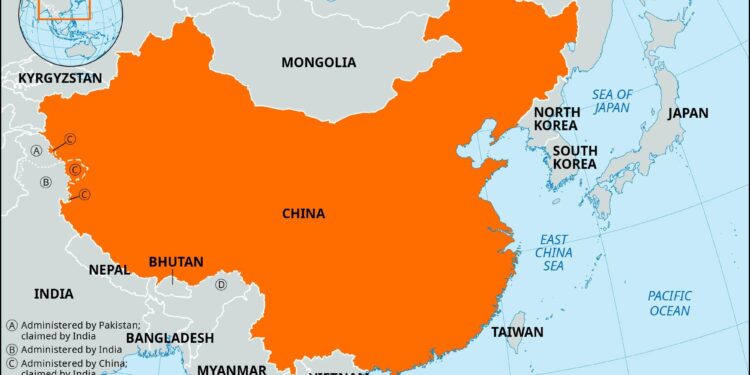In a significant shift in its international trade status, China has formally announced its decision to relinquish its designation as a developing country within the World Trade Organization (WTO). This move comes in the wake of escalating tariffs imposed by the United States, which have strained economic relations between the two global powerhouses. By stepping away from its developing country status, China not only acknowledges the evolving dynamics of its economic position but also seeks to address criticisms surrounding its trade practices and competitiveness. The implications of this decision resonate far beyond China’s borders, promising to reshape the landscape of global trade and diplomacy as the world watches how both nations navigate these turbulent waters.
China’s Strategic Shift from WTO Developing Country Status Amid U.S. Trade Pressures
In a significant pivot, China’s decision to relinquish its developing country status within the World Trade Organization (WTO) marks a critical response to escalating trade pressures from the United States. This strategic maneuver reflects Beijing’s recognition of its growing economic power and the need to adapt to the changing dynamics of global trade. Over the past few years, the U.S. has imposed a series of tariffs aimed at curbing China’s influence, which has prompted Beijing to reassess its position in international trade forums. By stepping away from its classification as a developing nation, China aims to bolster its credibility and negotiate from a position that reflects its current economic stature.
The implications of this shift can be profound, altering both China’s approach to trade negotiations and its standing among WTO members. Key considerations include:
- Increased Scrutiny: China may face heightened scrutiny regarding its trade practices and economic policies as it transitions to a more advanced status.
- Negotiation Leverage: Moving away from preferential tariffs associated with developing country status could provide China with greater leverage in negotiating trade agreements.
- Global Trade Relations: Other nations may also reconsider their own positions within the WTO, creating a ripple effect in international trade dynamics.
| Factors | Impact |
|---|---|
| Tariffs | Potential for increased bilateral trade tensions |
| WTO Relations | Reformation of multilateral trade agreements |
| Domestic Policy | Adjustments in economic strategy to maintain growth |
Implications of China’s Decision for Global Trade Dynamics and Economic Policy
The recent decision by China to relinquish its status as a developing country within the World Trade Organization (WTO) marks a significant turning point for global trade dynamics. This move comes in the wake of escalating trade tensions with the United States, particularly in light of imposed tariffs. By stepping away from this classification, Beijing aims to strengthen its bargaining power on the international stage, positioning itself as a more assertive player in the global economy. The implications of such a shift extend beyond mere labeling; they reshape trade relationships and economic policies worldwide, as nations recalibrate their strategies to engage with China.
Several key outcomes are likely to emerge from this transition:
- Increased Trade Competition: With a more fortified global standing, China may implement policies that promote competitive advantages, compelling other economies to adapt.
- Revising Tariff Strategies: Other nations, particularly those aligned with U.S. interests, may rethink their tariff strategies in response to China’s newfound stance.
- Investment Shifts: Foreign direct investment may witness a shift, as investors reassess the risk profiles of engaging with a redefined Chinese economy.
| Country | Potential Response to China’s Decision |
|---|---|
| United States | Reassess tariff policies; potentially enhance trade agreements with allies. |
| European Union | Evaluate trade relations; focus on digital and green technologies. |
| India | Seek to strengthen regional ties; promote local industries. |
Recommendations for a Balanced Approach to Address U.S.-China Trade Relations
To foster a more constructive U.S.-China trade relationship following China’s abandonment of its WTO developing country status amid tariffs, a series of strategic measures can be adopted. Policymakers on both sides should prioritize dialogue and negotiation, focusing on shared economic interests while navigating contentious issues. Key recommendations include:
- Enhanced Communication: Establish regular dialogue platforms for government officials and business leaders to discuss trade policies and resolve disputes.
- Joint Economic Initiatives: Promote collaborative ventures in technology, renewable energy, and infrastructure that can benefit both economies.
- Consumer Protection Standards: Work towards harmonizing regulations that not only protect consumers but also facilitate smoother trade flows.
Additionally, to mitigate the adverse effects of tariffs and support economic resilience, a balanced approach that encourages domestic investment while maintaining competitive trade practices is essential. A potential framework for action could include:
| Action Item | Goal |
|---|---|
| Investment in Innovation | Stimulate R&D to enhance competitiveness against Chinese manufacturing. |
| Trade Adjustment Assistance | Support affected workers and industries due to trade disruptions. |
| International Cooperation | Strengthen alliances with other nations to collectively address global trade imbalances. |
Insights and Conclusions
In conclusion, China’s decision to relinquish its status as a developing country within the World Trade Organization marks a significant turning point in its economic and diplomatic strategy amid escalating trade tensions with the United States. By stepping away from this classification, Beijing aims to mitigate the impact of punitive tariffs and reframe its position in the global market. This move not only reflects China’s growing economic stature but also signals its intent to engage more forthrightly in international trade discussions. As the global economy continually evolves, the implications of this decision will reverberate beyond trade policies, potentially reshaping geopolitical relationships and the dynamics of global commerce for years to come. As both nations navigate this complex landscape, the world will be watching closely to see how these developments unfold.














